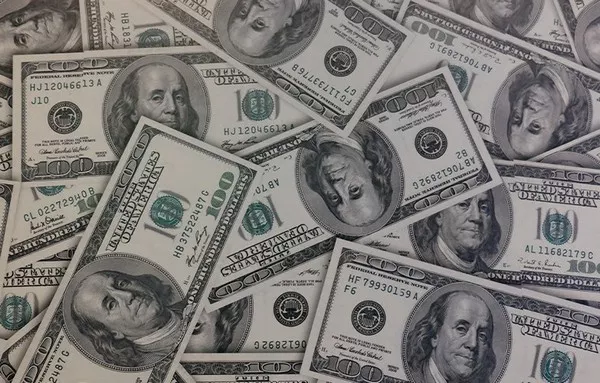The U.S. dollar (USD) is often referred to as the world’s reserve currency, and its stability is of global significance. However, like any other currency, the USD is not immune to economic and financial challenges. In this article, we will explore the hypothetical scenario of the collapse of the USD, examining the potential causes, consequences, and the global impact of such an event.
1. The USD as a Global Reserve Currency
The United States dollar has held a dominant position in the global financial system for many decades. Central banks around the world hold significant reserves of USD, and international trade is often conducted in this currency. The trust and stability associated with the USD have contributed to its role as a global reserve currency.
2. Hypothetical Causes of USD Collapse
While the collapse of the USD is an extreme and unlikely scenario, it is essential to explore some hypothetical causes to understand the potential consequences:
Hyperinflation: One possible cause of USD collapse could be hyperinflation, where the currency rapidly loses value due to excessive money printing by the U.S. government. This could erode confidence in the currency, leading to a loss of its reserve status.
Economic Crisis: A severe and prolonged economic crisis in the United States could weaken the USD. High levels of debt, low economic growth, and financial instability could lead to a loss of investor confidence.
Geopolitical Factors: Geopolitical events, such as a global conflict or a sudden shift in alliances, could lead to a lack of trust in the USD, causing countries to diversify their foreign exchange reserves.
3. Consequences of USD Collapse
If the USD were to collapse, it would have profound and far-reaching consequences:
Economic Turmoil: The immediate aftermath of a USD collapse would likely be economic turmoil. The value of the currency would plummet, causing disruption in international trade and financial markets.
Impact on Investments: Global investments tied to the USD would be severely affected. Foreign governments, central banks, and investors holding USD-denominated assets, such as Treasury bonds, would incur substantial losses.
Inflation and Price Volatility: A collapse of the USD could lead to hyperinflation, making everyday goods and services significantly more expensive. This would place a heavy burden on the average American and disrupt global supply chains.
Global Recession: As the world’s largest economy, a U.S. economic collapse could trigger a global recession. The interconnected nature of the global economy means that economic shocks in the United States can have cascading effects on other countries.
Loss of Confidence in Fiat Currencies: A USD collapse could erode confidence in fiat currencies worldwide, potentially leading to a search for alternative reserve currencies or a return to the gold standard.
4. Alternatives to the USD
In the event of a USD collapse, other currencies and assets could potentially step in as alternatives:
Euro (EUR): The euro, used by 19 of the 27 European Union countries, could gain prominence as a global reserve currency. However, it would need to address its own economic and political challenges to earn that status.
Chinese Yuan (CNY): China’s yuan has been gradually internationalizing and could become an attractive alternative. The Chinese government has been actively promoting its use in international trade.
Gold: Historically, gold has been considered a store of value and a hedge against currency devaluation. A USD collapse could lead to increased demand for gold as a safe haven.
Digital Currencies: Digital currencies like Bitcoin and central bank digital currencies (CBDCs) could play a role in a post-USD world. These technologies offer benefits such as transparency and faster cross-border transactions.
5. The Global Impact
The collapse of the USD would have significant global repercussions:
Trade Disruption: The abrupt devaluation of the USD could disrupt international trade, leading to uncertainty and economic challenges for countries heavily reliant on exports to the United States.
Financial Market Turbulence: Global financial markets would experience significant turbulence. Investors worldwide would face losses, and financial institutions might struggle to cope with the fallout.
Geopolitical Shifts: A post-USD world could result in significant geopolitical shifts. Countries might seek to realign their alliances, and the balance of power in international relations could change.
Search for Stability: As trust in fiat currencies wanes, countries and investors may turn to assets they perceive as stable, such as gold or digital currencies. This search for stability could reshape the financial landscape.
6. Preparing for a USD Collapse
While the collapse of the USD remains a remote possibility, it is crucial to consider how individuals, businesses, and governments can prepare for such an event:
Diversify Investments: Diversifying investments across different asset classes and currencies can help mitigate the risk of a USD collapse affecting one’s financial holdings.
Risk Assessment: Businesses should conduct risk assessments to evaluate their exposure to USD-denominated assets and consider strategies for risk management.
Currency Alternatives: Explore the use of alternative currencies, including digital currencies, for cross-border transactions and investments.
Economic Resilience: Governments should focus on building economic resilience to withstand economic shocks. Prudent fiscal and monetary policies can help mitigate the risk of a USD collapse.
7. Conclusion
While the collapse of the USD is an extreme scenario, it is essential to understand the potential causes and consequences of such an event. The USD’s status as the world’s primary reserve currency has far-reaching implications, and a collapse would trigger economic and financial turmoil on a global scale. It is crucial for individuals, businesses, and governments to be prepared and consider alternative currencies and assets to safeguard their financial interests in an increasingly interconnected world.


